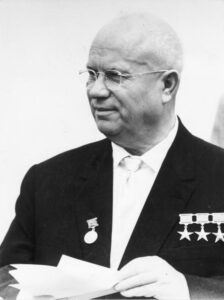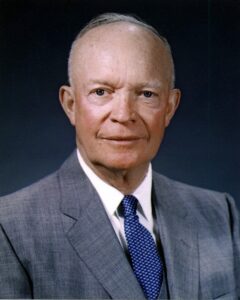 It’s never a good idea to find your nation behind it’s enemies in the arms race. Never was that made more clear than during the Cold War. It’s also not a good idea to begin to brag to your enemies about the superiority of your nation over theirs concerning the nation’s arms race status. Nevertheless, in a long and rambling interview with an American reporter on November 15, 1957, Soviet leader Nikita Khrushchev claimed that the Soviet Union had missile superiority over the United States. He then went on to challenge America to a missile “shooting match” to prove his assertion. It was a bold move, and one that fueled fears in the United States that the nation was indeed falling behind the Soviets in the arms race. People began to worry about not only the idea of the United States falling behind in the arms race, but also the idea that the Soviet Union and Nikita Khrushchev might actually launch their missiles at the US.
It’s never a good idea to find your nation behind it’s enemies in the arms race. Never was that made more clear than during the Cold War. It’s also not a good idea to begin to brag to your enemies about the superiority of your nation over theirs concerning the nation’s arms race status. Nevertheless, in a long and rambling interview with an American reporter on November 15, 1957, Soviet leader Nikita Khrushchev claimed that the Soviet Union had missile superiority over the United States. He then went on to challenge America to a missile “shooting match” to prove his assertion. It was a bold move, and one that fueled fears in the United States that the nation was indeed falling behind the Soviets in the arms race. People began to worry about not only the idea of the United States falling behind in the arms race, but also the idea that the Soviet Union and Nikita Khrushchev might actually launch their missiles at the US.
Khrushchev tried to compare the arms race to the space race, saying that if the United States had intercontinental ballistic rockets, “she had would have launched her own Sputnik.” Khrushchev was crossing boastful belligerence and calls for “peaceful coexistence” with the West, in what was a classic move for him. He bragged about Soviet missile superiority, claiming that the United States did not have what the Soviet Union had. Then, as cool as a cucumber, he issued a challenge, saying, “Let’s have a peaceful rocket contest just like a rifle-shooting match, and they’ll see for themselves.”
Following his fear-inspiring statements, Khrushchev began to speak about the future of East-West relations, saying that the American and Soviet people both wanted peace. He cautioned that although the Soviet Union would never start a war, “some lunatics” might bring about a conflict. In particular, he noted that Secretary of State John Foster Dulles had created “an artificial war psychosis.” In the case of war, it “would be fought on the American continent, which can be reached by our rockets.” NATO forces in Europe would also be devastated, and Europe “might become a veritable cemetery.” While the Soviet Union would “suffer immensely,” the forces of communism would ultimately destroy capitalism.
Khrushchev made these remarks just a few days after the Gaither Report had been leaked to the press in the  United States. The report supported many of the Russian leader’s contentions, charging that the United States was falling far behind the Soviets in the arms race. Of course, the critics of President Dwight D Eisenhower’s foreign policy, especially the Democratic Party, went on the attack, calling Eisenhower weak. The Gaither Report called for “an urgent strengthening of US missile technology, along with offensive and defensive military capabilities. The report also called for a fifty percent increase in US military spending and a redesign of the US Defense Department.” The Gaither Report was presented to President Eisenhower on November 7, 1957. The report suggested that Eisenhower’s military policy…the reliance on cheap nuclear weapons instead of expensive Army divisions…was inadequate. He kept the Report secret and generally ignored it, but its conclusions were leaked to the press. The public debate concerning the alleged “missile gap” between US and Soviet rocket arsenals continued through the early 1960s and became a major issue in the 1960 presidential campaign between Richard Nixon and John F Kennedy.
United States. The report supported many of the Russian leader’s contentions, charging that the United States was falling far behind the Soviets in the arms race. Of course, the critics of President Dwight D Eisenhower’s foreign policy, especially the Democratic Party, went on the attack, calling Eisenhower weak. The Gaither Report called for “an urgent strengthening of US missile technology, along with offensive and defensive military capabilities. The report also called for a fifty percent increase in US military spending and a redesign of the US Defense Department.” The Gaither Report was presented to President Eisenhower on November 7, 1957. The report suggested that Eisenhower’s military policy…the reliance on cheap nuclear weapons instead of expensive Army divisions…was inadequate. He kept the Report secret and generally ignored it, but its conclusions were leaked to the press. The public debate concerning the alleged “missile gap” between US and Soviet rocket arsenals continued through the early 1960s and became a major issue in the 1960 presidential campaign between Richard Nixon and John F Kennedy.


Leave a Reply